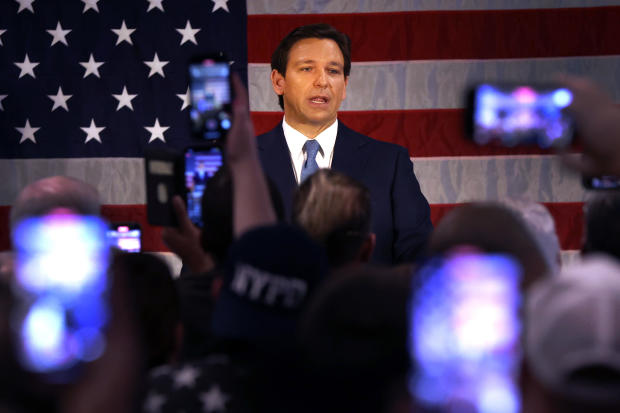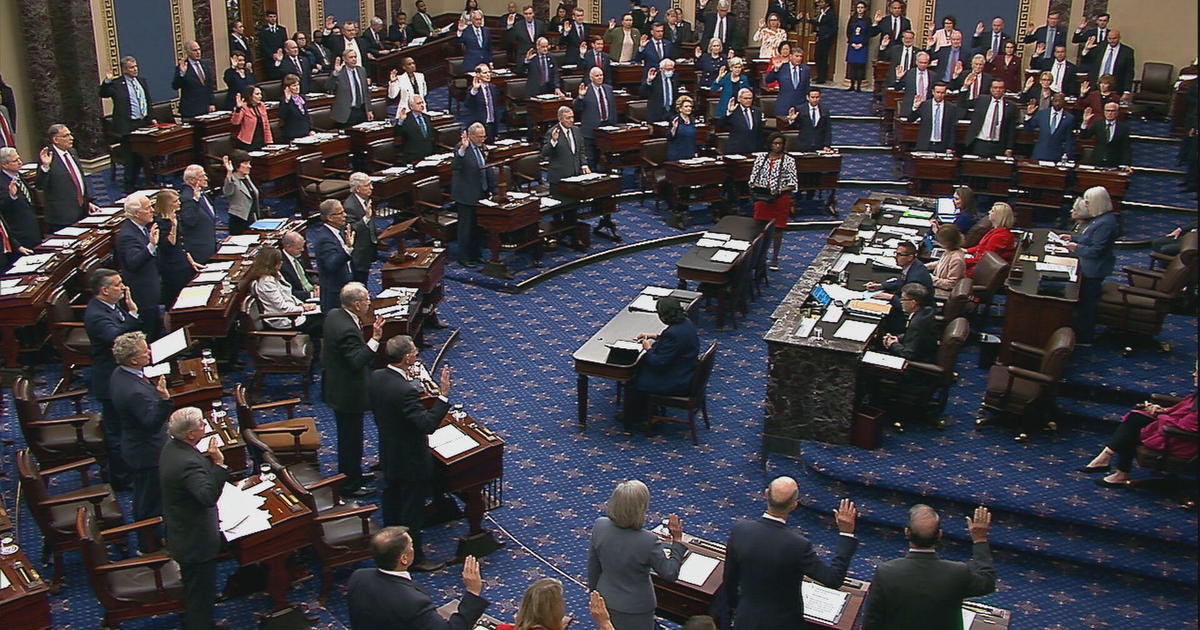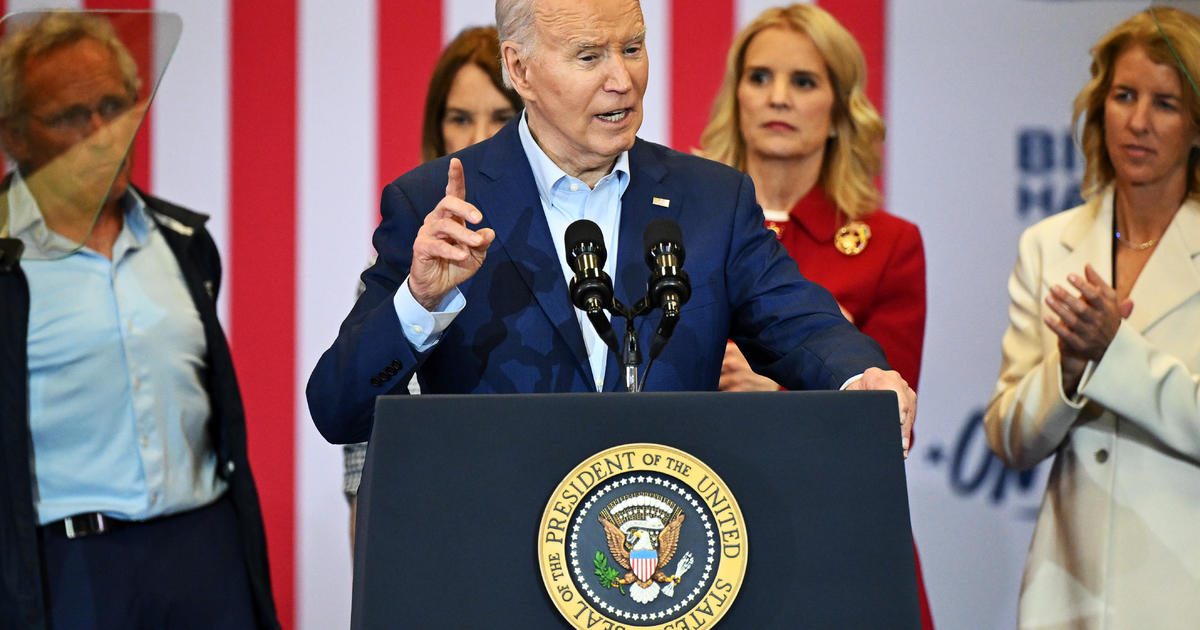Entitlement reforms could set Republicans apart in a potentially crowded GOP presidential primary
Debate over the future of Medicare and Social Security have exposed a rift among Republican presidential candidates and potential 2024 hopefuls as GOP lawmakers and the White House face off over how to address the ballooning federal debt. It's an issue Democrats are all too happy to seize on as the GOP primary race for the White House starts to take shape.
Some Republicans are leaning into a longtime GOP stance that programs such as Social Security and Medicare must be examined, while others are shifting away from touching such programs, discussion which has proven in the past to become unpopular with some voters.
As the crisis over the debt limit looms, President Biden has warned Republicans are gunning for Social Security and Medicare. In his recent State of the Union address, Mr. Biden appeared to set the negotiation stage from the podium taking Social Security and Medicare off the table. He then took his message on the road, targeting a plan by Republican Sen. Rick Scott of Florida that called for the sunset of all federal legislation after five years unless Congress acts. Scott has since revised the plan to exclude the two programs.
In preliminary posturing for debt limit negotiations, House Speaker Kevin McCarthy said Republicans would not touch Social Security and Medicare. But not all potential Republican presidential candidates are vowing a hands-off approach — and in at least one case it has become a point of contention.
Former President Donald Trump has already gone after the past positions of Florida Governor Ron DeSantis, who is considered in early 2024 surveys and by GOP operatives as Trump's biggest threat in a primary. In several Truth Social posts, he claims DeSantis wants to cut Social Security and Medicare, posting on Tuesday, "HE IS A WHEELCHAIR OVER THE CLIFF KIND OF GUY, JUST LIKE HIS HERO, failed politician Paul Ryan."
DeSantis previously voted for budget proposals as a member of Congress in 2013, 2014 and 2015 that would raise the retirement age for Social Security, as well as establish a bipartisan commission to look at any further reforms to the program. These resolutions did not become law.
During his 2012 campaign to represent Florida's 6th Congressional District, he told the St. Augustine Record that he'd support privatizing Social Security and Medicare, and there's a need for "some market forces in there, more consumer choice, and make it so that it's not just basically a system that's going to bankrupt when you have new people coming into it."
He added that he would not change the programs for people already in or near retirement and said "there's settled expectations there, particularly for people that are actively on it now."
"But I think what we need to do, for people in my generation particularly, is start to restructure the program in a way that's going to be financially sustainable," DeSantis said in 2012. "If we reformed it for people in my generation, you wouldn't see immediately probably any savings in the budget, but I think the long term picture would then improve dramatically."
But Trump's own stance on entitlements appears to have shifted, a sign he may believe the issue is a vulnerability for Republicans moving forward.
Earlier this month he claimed "under no circumstances should Republicans vote to cut a single penny from Medicare or Social Security." It echoed his stance when he launched his first presidential bid back in 2015. But in an interview with CNBC in January 2020, Trump was asked about entitlements and said "we will take a look at that." He has also called for eliminating payroll taxes, which fund Social Security and in part Medicare.
Mr. Trump's current stance also sets him apart from other candidates or potential hopefuls who have weighed in on the issue in recent weeks.
"While I respect the speaker's commitment to take Social Security and Medicare off the table for the debt ceiling negotiations, we've got to put them on the table in the long term. And right now, President Biden's policy is insolvency," former Vice President Mike Pence said in a recent interview with CNBC addressing the debt ceiling debate, reiterating similar statements he has made in recent weeks.
Pence, who has not yet announced an official presidential bid but has taken trips to several early primary states, claimed there are ways to solve the solvency issue, though he has not laid out an official plan. In the CNBC interview, he said there are multiple options including suggesting there are "things that you could do in personal savings accounts in the long term, allowing younger Americans to get a higher rate of return."
In a recent speech he also noted he was part of the push to reform Social Security under President George W. Bush in 2005. But approval for that effort plummeted as key details went unaddressed, and the plan, which involved a move toward partial privatization of the program, failed to move forward.
Former United Nations Ambassador Nikki Haley, who has officially launched a bid for the White House, has also signaled support for reform but it remains to be seen exactly how she would want to change programs.
"Should we reform those entitlements? Yes, but should we take anything from people who have already been promised? No," Haley told NBC News in an interview soon after announcing her candidacy.
"Everybody that's been promised money, they get it, we don't take it from anybody, but these new ones coming in, they know it's going to be broke by the time they get there. Those are the ones we fix. The younger generation, we go and we do a new system on how they're gonna get it," she said.
Whether GOP candidates are vulnerable to such attacks on this issue during the primary depends on how they respond, said Douglas Holtz Eakin, economist and president of the American Action Forum. He said such attacks cannot go unchallenged. But he also pointed out that presidential hopefuls cannot gloss over the root of the issue.
"I'm looking for people who take the time to educate instead of going straight to the proposal," he said. "I think if you go straight to the proposal it's a mistake. People don't fully understand the problem."
As the U.S. national debt hit $31.4 trillion this year, and GOP lawmakers tee off for a showdown with the Biden administration over the debt limit, talk about the future of such programs heated up. The deficit this year is about $1.4 trillion and it's expected to grow to average about $2 trillion over the next ten years. Social Security and Medicare are both included in mandatory spending and make up two of the largest categories in the federal budget.
If no action is taken, both Social Security and Medicare are projected to remain solvent through the next four-year presidential term, perhaps making it politically convenient to remain hands off. But the reality is both programs could face financial challenges soon after that if Congress does not address them.
More than 65 million people currently receive Social Security benefits. According to the latest Trustee Report, beneficiaries will be able to receive full payments until 2035, but from there, funds would start to become depleted. Benefits would then need to be reduced by about 20% from what they are now. The Congressional Budget Office has slightly earlier projections on when the program would become insolvent.
"If you wait until the trust funds exhaust, then you have to make some real dramatic decisions really quickly, raising taxes rather dramatically, cutting benefits," said Bill Hoagland of the Bipartisan Policy Center. "No, these are things that could be phased in over a decade such that these would not be massive changes to individuals reaching retirement in 2033 or so."
Medicare is also facing looming financial shortfalls. The 2022 Medicare Trustee report projects the Part A trust fund will be depleted in 2028. At that time, Medicare will be able to cover nearly all Part A benefits, and nearly 90% with revenues alone into 2031. Since 1990, the fund has come within six years of depletion six times according to a KFF analysis. Lawmakers have never allowed the fund to become fully depleted.
Medicare could be a more challenging program to address due to the multiple parts and revenue sources. But according to Gary Burtless, a senior fellow and economist at Brookings, Medicare is always just a few years away from one of its funds running out of money, and Congress always does something.
As Republican presidential candidates and potential hopefuls weigh in on the future of Social Security and Medicare including some signaling openness to more drastic reforms, Democrats are all too eager to point fingers, accusing Republicans of wanting to gut programs in statements, speeches and fundraising emails.
A GOP strategist called it a "typical attack" of Democrats. Republican operatives argue Democrats are the ones playing politics with the programs, claiming they would attack any idea Republicans come out with to address them.
While Mr. Biden has vowed to protect and strengthen the programs, it is not yet clear how he would address potential financial challenges moving forward. Any congressional effort would require bipartisan support.
Earlier this month a group of Democratic lawmakers, including Sens. Bernie Sanders and Elizabeth Warren, released their own plan to expand Social Security and address solvency. The proposal would lift the earning cap on Social Security taxes and subject all income above $250,000 to the Social Security payroll tax.




